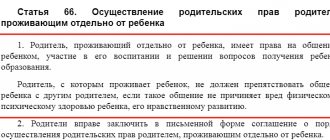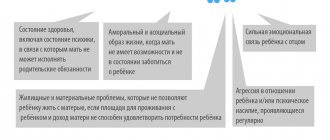Rights and responsibilities of parents
Chapter 12 of the IC of Russia establishes a complete list of the rights and responsibilities of parents in relation to their children. In particular, the following principles must be taken into account:
- mother and father have equal rights and responsibilities;
- termination of rights is carried out in the event of deprivation of parental rights in court;
- possible limitation of powers;
- After eliminating the violations, restoration of paternity/maternity is allowed.
This list is valid for the biological mother and father, as well as adoptive parents after the court decision on adoption has entered into legal force.
See also:
- What rights do parents have to their children after divorce?
- How to change a child's last name?
Communication between the child and the second parent after divorce
The law guarantees equal rights of mother and father, regardless of the address of residence (Article 66 of the RF IC).
Communication is accompanied by meetings with children, participation in their upbringing, and resolution of issues related to development and education. The second parent, the legal representative with whom the minor lives, should not and cannot interfere with communication with him. The exception is harm to the child’s psychological or physical health. The procedure for communication is established by a settlement agreement or by the court based on the claim of one of the parents. For violation of established conditions, legal liability rules may apply.
See also:
- What to do if your ex-wife does not allow you to communicate with your children after a divorce?
- Taking a child abroad after divorce
Who will the children stay with after the divorce?
As judicial practice shows, in 80% of cases, children remain with their mothers after divorce. This is due to psychological reasons, as well as the belief that a woman can take care of her child much better than a father.
It is extremely rare for minors to be handed over to their fathers. Most often this happens by mutual consent of the parents or under the following circumstances:
- woman's abuse of illicit drugs;
- recognition of her incapacity;
- The mother's health does not allow her to fully engage in parenting.
You can learn more about the specifics of establishing guardianship over minors by following this link.
What to do if your ex-wife does not allow you to communicate with your children after a divorce?
What rights do parents have to their children after divorce?
What can a father demand in a divorce?
Every man who breaks off a legal relationship with a woman should know what rights the father has in the event of a divorce if the children, by mutual consent, remained to live with their ex-wife.
Here are some of them:
- Receive reliable information about the child (health, accidents, his successes and failures).
- Visit a common child at set hours.
- Plan and prepare cultural events held during visiting hours.
- Do not allow the mother to threaten or deprive the father of the opportunity to spend time with the child at the agreed time, on the basis of Art. No. 55 IC RF.
- Call the police if the right to visit joint children is violated, request police reports as evidence, which can later be presented in court.
- Do not give consent for the child and mother to travel to another state, etc.
- Request a change in the divorce decree if the mother, without the consent of the second parent, changes the order of meetings with the child without prior approval.
- Complain about child abuse and violence against them in the family by the mother (provide evidence).
The procedure for communicating with a child by agreement
After the divorce process is completed, the separated parent has the following rights:
- regular meetings with children;
- unlimited communication with them;
- obtaining information about children at any time (in educational and medical institutions);
- expressing personal opinion on all issues related to the upbringing and maturation of a minor;
- regulation of issues related to the movement of children outside Russia.
Taking these rules into account, parents can independently discuss the procedure for communicating with their child after a divorce. This can be done orally or in writing.
The law only recognizes written agreements drawn up by a notary. Parents are required to independently draw up a settlement agreement indicating the circumstances of communication, as well as measures of liability for violating the terms of the agreement. The document has legal force and begins to be valid from the moment the agreement is registered by a notary.
Oral agreements have no legal force, so it is unlikely that an unscrupulous parent will be held accountable. But if the mother and father can resolve all conflicts on their own, then this method will be more useful for the child - it eliminates psychological trauma.
See also:
- How to draw up a settlement agreement?
Schedule of communication with the child
The communication schedule is the main issue on which disputes and conflicts arise between parents. The mother and father will have to discuss the following issues:
- meeting places;
- regularity of visits;
- duration;
- the presence of unauthorized persons during meetings;
- the possibility of a long vacation together (for example, a trip to the sea during the holidays).
When scheduling meetings, you should take into account the age of the children and the work schedule of the parents and the child.
Contents of the agreement
The contents of the settlement agreement must contain the following categories of information:
- visiting schedule;
- possibility of deviation from the routine;
- liability of participants for violation of conditions;
- additional support issues (for example, the cost of purchasing a trip to the sea during a joint vacation).
Sample agreement on the procedure for communicating with a child
Settlement agreement on the procedure for parent participation in the child’s life
February 12, 2021Sochi city
Father: Anton Petrovich Belokolov, born May 18, 1974, resident: Sochi, st. Petrovskogo 14/7, passport NM 125478, on one side;
Mother: Antonina Stepanovna Belokolova, born March 16, 1976, resident: Sochi, 187 Putevoy Ave., passport NM 854898, on the other side;
entered into this agreement in order to establish the procedure for the participation of a separately living parent - the father - in the life of their common minor daughter - Stefania Antonovna Belokolova, born on August 14, 2005.
Rules for the exercise of rights and obligations:
- all issues related to education should be resolved jointly;
- the father and his relatives have the right to freely see and communicate with their daughter;
- mother and father have equal responsibilities and implement them equally;
- set a schedule of regular meetings outside the home: every Sunday from 12:00 to 19:00;
- designate the right to take an annual joint vacation for 10 days (in summer or winter, by mutual agreement of the parties);
- visiting cultural events no more than 4 times a month and returning home no later than 22:00;
- guarantee of the possibility of temporary residence with a separate parent, but only during the holidays and only at the request of the minor.
Duties of the parties:
- the father guarantees timely notification of the upcoming visit;
- the mother gathers the child to meet the father;
- participants undertake to comply with the requirements of the agreement;
- mutual notification of parents about accidents with a child.
The agreement is valid until adulthood. Participants can make amendments to the agreement by mutual consent of the parties.
Belokolov A. P. Belokolova A. S. signature signature
Courts will have to determine the order of communication between fathers and children
Draft federal law No. 604443-7 “On Amendments to Article 66 of the Family Code of the Russian Federation” (hereinafter referred to as the bill) causes me, as a lawyer practicing in family law, an ambivalent attitude.
The forms of possible communication between a child and a parent living separately from him are listed: through personal meetings, telephone conversations, text, voice and other messages transmitted over telecommunication networks, including mobile, radiotelephone communications, as well as through information and communication networks, including Internet network.
At the same time, the duration of weekly communication between the child and the parent living separately from him, carried out through personal meetings, during the proceedings of the dispute about the procedure for exercising parental rights cannot be less than three hours.
On the one hand, the topic of abuse of rights by a parent who remains to live with a child in relation to a parent who pays child support has long become a “common place” in Russian family law enforcement practice and even, I would say, part of the Russian post-Soviet “ cultural code."
In my practice and the practice of my acquaintances, practicing lawyers, there are plenty of stories when ex-wives, after a divorce (obviously, the bill under discussion is about fathers - in 90% of cases, children remain to live with their mothers) settle scores with their ex-husbands by limiting their communication with children and directly inciting children against their fathers, often with the help of outright lies, they do not allow the father to see the children under flimsy pretexts or without them at all. In a number of cases, they arrange their personal lives in such a way that the alimony paid for the child is spent on children from other fathers, while the child to whom this alimony is transferred is deprived.
My work experience leads to the conclusion that fathers are discriminated against after divorce.
It seems to me that the proposed bill will not solve this problem of discrimination, since it does not provide the necessary specific provisions for translating the amendments into legal reality, and does not contain procedural rules for the implementation of new substantive rules.
However, this is not surprising, since the explanatory note to the bill directly states that the purpose of the bill is to secure a minimum time for communication with a child through personal meetings only during the trial on the procedure for the exercise of parental rights by a parent living separately from the child, as well as clarifying the list of methods of communication between a child and a parent living separately from him in order to avoid prohibitions on certain methods of communication. That is, it turns out that the authors of the bill did not even anticipate the possibility of forced implementation of the proposed norms of law. It is a pity that once again we have to repeat the elementary truth regarding our bills: any duties are dead without responsibility for their failure to fulfill them.
At the same time, the appearance of the bill should be welcomed as the first real attempt to eliminate the sharp “bias” in favor of mothers that has developed in law enforcement practice. Perhaps these frankly “half-hearted” amendments will be followed by more thoughtful changes. After their adoption, new judicial practice will inevitably begin to form, generalizations of the Supreme Court of the Russian Federation will appear, the shortcomings of the novelties will begin to be discussed at various congresses and conferences, on the basis of old problems, “refreshed” by the adoption of amendments, dissertations will be defended. And finally, the legislator will probably decide to dot all the i's and give the currently proposed amendments completeness. Unfortunately, once again we have to admit that our legislative technology leaves much to be desired, but this is a reality in which all of us - both lawyers and courts - have to constantly act, we are accustomed to.
However, it should be noted that if the bill under comment is adopted, some positive changes in judicial practice should definitely occur.
I cannot help but cite a recent striking example from my own practice: a statement of claim regarding the procedure for the exercise of parental rights by the father, in which, as the sought method, personal and telephone communication was proposed without a limitation in duration with a warning to the mother about it 1 hour in advance, was left by the court without progress with strict wording: “the plaintiff did not indicate the days and times of the required meetings.” At the same time, the father knows in advance that if he asks for specific days and times of meetings, then on these days and times he will not see the children, since it is on these days and times that the children will be somewhere on the street, in sports sections, at classmates’ birthdays, etc.
It is impossible in practice to enforce a court decision on meetings on specific days and times - the bailiff will not deal with this. And it is unrealistic to confirm that there was no one at home when the father came on the appointed day and time. It turns out that the father will not be able to prove the non-compliance with the court decision by his ex-wife and demand a review of the established procedure for communicating with children, as the norm of paragraph 3 of Art. 66 RF IC. And he won’t see the children until his ex-wife deigns to allow him to do so. But if the father had the right to communicate with the children in any place where it is convenient for the children at that moment, on any day of the week when it would be convenient for the father and children, then deprive him of the opportunity to communicate with the children, without openly breaking the law, the mother it would be much more difficult. It didn’t work out on Monday (children at a birthday party), it didn’t work out on Tuesday (outside), but it can’t work out all week? Abuse by the ex-wife would be obvious to the court in such a case. The father, if he wanted, could achieve the number of hours of communication per week prescribed by the court. But if the court establishes that the time of communication is only Monday at 20:00, Tuesday at 18:00 and Wednesday at 19:00, then it turns out that on Thursday, Friday, Saturday and Sunday the father has no right to approach his children, even if At the time provided for communication, the children allegedly could not communicate with him for objective reasons. And the court, in its narrow-mindedness, does not allow the possibility of telephone conversations or Internet communication with children to be secured - only specific days and times of meetings!
If the proposed amendments are adopted, the above court ruling will become illegal. The court will have to learn to make decisions on determining the order of communication between fathers and children, which include not only the time and days of meetings with children, but also the possibility of telephone conversations, text, voice and other messages, including via the Internet, and determine the volume of such communication.
Nowadays, judicial practice in cases of determining the order of communication with children is, as a rule, predictable and looks depressing for fathers. Even in the review of the practice of courts resolving disputes related to the upbringing of children (approved by the Presidium of the Supreme Court of the Russian Federation on July 20, 2011), it was noted that the practice of indicating in court decisions the right to telephone communication or communication via the Internet of a separately living parent, the parents are obliged to treat each other correctly so as not to undermine each other’s authority in the eyes of the child (courts of the Rostov region); the obligation not to interfere with communication between father and son at his request through correspondence, by telephone and via the Internet (on the mother’s side); not to form in the child a negative opinion about each other (courts of the Republic of Tatarstan).
However, in practice, even if the court comes to the conclusion that there are no objective circumstances preventing the father from communicating with the child, taking into account the mother’s “opportunity to influence the formation of a negative attitude” of the child towards the father, the court decides to limit the time the father communicates with the child ( see: Appeal ruling of the Moscow City Court dated January 24, 2021 in case No. 33-2596/2018). Isn't this nonsense?
The logic of the court is transparent, but no less outrageous for any sane person: the child lives with his mother, the mother sets him up against his father, therefore it is necessary to limit the child’s communication with his father so that he is less in a psychologically traumatic situation: both when he sees his father and when After this, he hears from his mother that he is a “traitor” for meeting his father. Where is the objectivity? Let the father pay child support and accept that he will always be the “bad guy” for his child? Whatever conflictual relations between the father and mother may have developed, the court readily refuses the father to communicate with the child on the father’s territory, determining the procedure for communication only in the presence of the mother (see, for example, the Appeal ruling of the Voronezh Regional Court dated December 7, 2021 in the case No. 33-9211/2017; Appeal ruling of the Novosibirsk Regional Court dated September 14, 2021 in case No. 33-8269/2017). What kind of communication this is and in what light the father appears in it, I think, is easy to imagine.
What is the legal meaning of such humiliation of the father is most often inexplicable. There are examples when the courts unexpectedly made fair decisions and granted fathers the right to communicate with children on the father’s territory, but the Supreme Court of the Russian Federation overturned the court decisions on the grounds, for example, that with the communication schedule that the father asked for, and taking into account the communication schedule with his grandparents (although this time is set separately by the court and does not relate to parental time at all and should not be taken into account in a dispute about parental rights!) the boy will spend 14 days a month (this is even less than ½ month) in a family that is extremely conflict-ridden to his mother, with whom he lives1. The fact that the mother has an extremely conflictual attitude towards the child’s father is not taken into account and does not affect anything. What can I say, the “equality” of parents in the right to communicate with the child in all its glory.
Of course, the proposed amendments to the RF IC need to be supplemented, in my opinion, with clarifications and specifications. For example, it should be normatively established not only the minimum number of hours per week for communication with a separately living parent for the period until the dispute is resolved, but also when the dispute is resolved: the father should have the right to personally communicate with the child at least 48 hours a week (nowadays, courts often hide behind interests of the child, provide fathers with only 2-4 hours a month!).
It is necessary to consolidate the ratio of communication with the child by phone and the Internet with direct communication - it is obvious that these types of communication cannot be equivalent, and if the father lives far away and cannot meet in person, then he should be given multiple times more time to communicate with the child by phone or the Internet.
In order to avoid abuse of rights on the part of the mother, I consider it necessary to redistribute the burden of proof in a dispute about non-execution of court decisions on the order of communication with the child: it is necessary to place on the mother the burden of proof that she allowed the father to see the child and/or communicate by phone and the Internet. And if, upon the complaint of her ex-husband, she cannot prove compliance on her part with the court decision, then, firstly, she is obliged to provide the father with additionally all the illegally “taken” time of communication, and secondly, she must return to her ex-husband ½ of the alimony paid by him for that the time when she did not allow the father to see the child. Only when the rights and responsibilities of the father become inseparable can the “maternal bias” in disputes about children be overcome.
1 see: N. Kozlova. Son on schedule // Rossiyskaya Gazeta - Federal Issue No. 6410 (138) // URL: https://rg.ru/2014/06/24/razvod.html
Limiting communication with the other parent's child
Art. 73 fixes the rules and grounds for limiting the communication of children with the second parent. These include:
- negative consequences for the psychological development of a minor or his emotional state;
- the separated parent sets the children against the other parent;
- visits disrupt the educational process or interfere with attendance at extracurricular activities;
- Spending time with the father is dangerous for the child's health.
Application, documents and where to apply with them?
District courts of general jurisdiction deal with issues. It is necessary to contact the authority that initially considered the issue of establishing rules of communication.
The petition must contain mention of the following points:
- what court and when was the main decision on establishing the procedure for communication with children made?
- reasons for restricting rights;
- attached evidence.
In addition to the statement of claim, the person must provide evidence confirming violations on the part of the parent. It can be:
- a police certificate confirming the use of physical violence against a child;
- explanations of witnesses;
- certificate from extracurricular clubs.
Paternity rights upon divorce
Parents' awareness of their rights during separation is often low.
Maternal rights are increasingly discussed in the media, but what rights a father has during a divorce are discussed less frequently. In family law there is a concept - physical custody of a child. Mainly associated with physical care of the pupil. This guardianship determines where the child will live. Namely:
- whether the minor family member will live with both parents, spending an equal amount of time in each home;
- whether the child will live with one parent while visiting the other for a certain period of time.
In the case when the child is a teenager, he can decide (at the age of 10) who he wants to live with - with mom or dad. The basis is Article No. 57 of the Family Code of the Russian Federation. This desire can become decisive in establishing the order of communication with the child and determining the place of residence of the offspring in the future.
One parent may have both legal and physical custody, while the other may have visitation rights but not have any custodial rights and therefore will not be able to make decisions that affect the welfare of the minor children.
The rights of a spouse during a divorce should not be violated if the man’s actions are aimed at improving the life of his offspring.
Lawyer's answers to frequently asked questions
Can a court refuse to communicate with a child?
Yes, if communication with a parent living separately violates the interests/rights of the child. In order to eliminate restrictions and prohibitions, it is necessary to eliminate the identified shortcomings and judicial observations, and then re-apply to the court with a statement of claim.
What to do if the mother forbids communicating with the child and prevents this in every possible way?
The woman faces legal liability under the articles of the Administrative Code. The father should collect evidence confirming the violation of the ability to communicate with the children, and then send a statement of claim to the court complaining about the actions of the ex-wife. The judge holds the mother accountable and warns that if the established rules of communication are violated again, the child may be transferred to the care of the father.
Is it possible to oblige the father to communicate with the child?
No, it's a parent's right. According to the RF IC, children also have the right to communicate with their father, but forced communication can lead to negative consequences for the emotional and psychological development of minors.
Is it possible to set a schedule for a child’s communication with his grandparents?
Yes. Communication with other relatives can also fit into a schedule based on the child’s busy schedule. The main thing is to allow at least periodic meetings and visits.
Can I deprive a father of parental rights for non-participation in the child's life?
Yes. This is one of the grounds provided for by the Family Code. But it is necessary to confirm that the parent had the opportunity and there were attempts to establish communication between the mother and children, but the father was categorically against this.
Communication schedule between father or mother and child
- It is necessary to determine as clearly as possible the time of meeting with the child. Please remember that this time period will be binding on both parents. You should not declare and ask for time that will obviously be impossible for you to do. Violation of the schedule may be regarded as a violation of the rights of the child and subject to review, due to the presence of these circumstances;
- do not forget that you, as a parent, have not only parental rights in relation to your child, but also responsibilities for his maintenance. In this regard, pay alimony on time and do not allow your ex-wife to collect alimony through forced judicial proceedings. The court may regard this act as negative behavior of the parent and limit it in the communication schedule (this conclusion is confirmed by the practice of determining the order of communication with the child);
- When filing claims to determine the order of communication with the child, provide for possible meetings on holidays and weekends. According to the law, parents have equal rights, so it is quite logical to require alternating meeting days on special dates. For example, this applies to the birthday of a minor, New Year, March 8 and other holidays that are significant to you;
- It is important to remember that the presence or absence of the second parent during the meeting with the child is the main issue of the process. Every parent who asks to let their child go to amusement parks or children's events wants to be left alone with him. And the other party to the process often insists on meetings in her presence and under her control, which is very inconvenient given the breakdown of relations. We will help you justify your position in court;
- This type of dispute about children will take place with the mandatory participation of the guardianship and trusteeship authority. To give an opinion on the case, it will be important for the social service worker to understand the characteristics of the individual, and therefore it is necessary to prepare for the trial fully and with understanding. During your consultation, our lawyer will provide a broader list of recommendations on this issue.
Read about our participation in the case and the procedure for communicating with the grandmother’s child at the link. The interests of the grandmother were fully protected, and the arguments of the child’s father were recognized as far-fetched and untenable.









